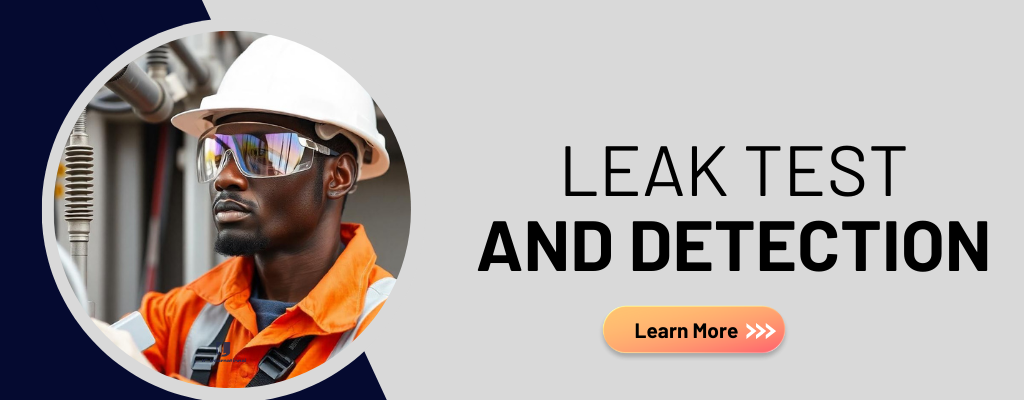
Enhancing Equipment Integrity: The Importance of Leak Testing in Oil & Gas
Leak testing and detection play a pivotal role in ensuring safety, operational efficiency, and environmental compliance in the oil and gas industry. Given the high-risk nature of oil and gas operations—ranging from extraction, processing, storage, and transportation—minimizing leaks is essential to preventing catastrophic events that could endanger human lives, cause environmental damage, and lead to financial losses.
Here’s a closer look at why leak testing and detection are critical to the oil and gas industry:
1. Ensuring Safety
Safety is the top priority in the oil and gas industry. Leaks, whether from pipelines, tanks, valves, or other infrastructure, can result in hazardous conditions such as explosions, fires, and exposure to toxic gases. Regular leak testing helps to identify vulnerabilities before they result in dangerous incidents. Early detection and immediate corrective action can prevent accidents, ensuring the safety of personnel and communities living near oil and gas facilities.
2. Environmental Protection
Leaks in oil and gas operations can have severe environmental consequences, including the contamination of soil, groundwater, and marine ecosystems. Crude oil and natural gas spills can damage wildlife habitats, harm aquatic life, and lead to long-term environmental degradation. Methane leaks, in particular, are a significant concern as methane is a potent greenhouse gas that contributes to climate change. Leak detection and repair programs help companies meet environmental regulations and reduce their carbon footprint, contributing to the fight against global warming.
3. Preventing Financial Losses
Undetected leaks can lead to significant financial losses. Even small leaks over time can result in the loss of valuable hydrocarbons, increasing operational costs. Moreover, leaks often require expensive emergency responses, cleanup efforts, and legal penalties. By implementing effective leak testing and detection strategies, companies can minimize these losses and ensure the profitability of their operations.
4. Maintaining Equipment Integrity
In the oil and gas industry, maintaining the integrity of equipment is critical for continuous and efficient operations. Leaks can be a sign of wear and tear, corrosion, or damage in pipelines, storage tanks, or pressure vessels. Routine leak testing enables companies to identify potential issues with equipment early on, preventing costly breakdowns, downtime, and unplanned maintenance. This proactive approach to equipment integrity helps to extend the lifespan of assets and ensures the smooth flow of operations.
5. Compliance with Regulations
Oil and gas companies operate under strict regulatory frameworks that mandate regular inspections and leak detection to protect the environment and public health. Governments and international bodies have implemented stringent guidelines requiring companies to monitor and repair leaks in their facilities. Non-compliance with these regulations can result in hefty fines, legal penalties, and reputational damage. Leak testing and detection are crucial for meeting these regulatory requirements and maintaining a positive corporate image.
6. Promoting Operational Efficiency
Efficient operations are key to maximizing production in the oil and gas industry. Leaks, however, can disrupt this efficiency by causing pressure drops, reducing flow rates, and wasting resources. Detecting and repairing leaks ensures that systems are operating at their optimal levels, preventing the loss of product and energy. This increases the overall efficiency of the entire supply chain, from extraction to refining and distribution.
7. Enhancing Corporate Responsibility
The modern oil and gas industry is under increasing pressure to demonstrate its commitment to sustainability and corporate social responsibility. Companies that actively invest in leak detection technologies and prioritize environmental protection are viewed more favorably by stakeholders, including investors, regulators, and the public. Leak detection programs signal a company’s dedication to reducing its environmental impact and upholding ethical business practices.
Common Leak Detection Methods
To achieve the benefits outlined above, companies in the oil and gas industry utilize various leak detection methods. These include:
- Pressure Testing: Used to verify the integrity of pipelines and tanks by pressurizing them and checking for any loss of pressure, which indicates a leak.
- Ultrasonic Testing: Detects leaks by using sound waves to identify changes in the flow of gases or liquids.
- Infrared Cameras: Used to visually detect gas leaks, particularly methane, by identifying temperature differences in the air.
- Acoustic Monitoring: Sensors detect the sound generated by escaping fluids or gases from leaks.
- Gas Detection Systems: Installed in plants to continuously monitor for the presence of hydrocarbons or other gases that may indicate a leak.
JC International is committed to ensuring the highest standards of safety, efficiency, and environmental protection in the oil and gas industry through our comprehensive leak testing and detection services. Our expert team uses advanced technologies to identify and address potential risks, helping you prevent costly leaks, maintain equipment integrity, and comply with industry regulations. JC International offers expert leak test and detection service in Nigeria.
Partner with us today to safeguard your operations and achieve sustainable success. For more information on how we can support your needs, please reach out to us at service@jcinternationalng.com

Leave a Reply